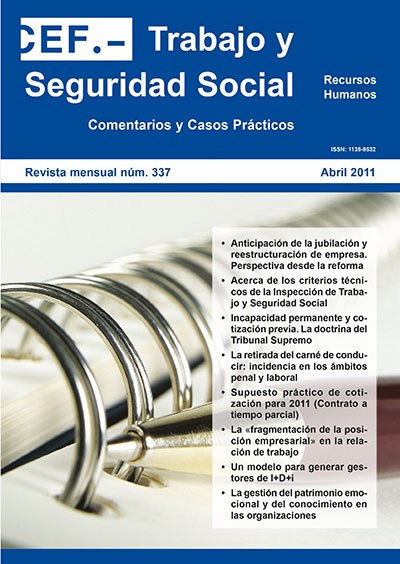Emotional capital and knowledge management in organizations
DOI:
https://doi.org/10.51302/rtss.2011.5187Keywords:
emotional capital management, knowledge management, management of fear, sense of belonging, socially sustainable organizationsAbstract
Emotional capital management in companies and organizations is considered as «capital» to emotions, to identify and manage the fear and sense of belonging to create emotionally sustainable organizations. This approach has a direct impact on knowledge management, whose purpose is to support business strategy, based on a study of the processes of identifying, measuring and use of knowledge available to a company or organization.
This theoretical base whose applicability has been recognized by several universities is the starting point for proposing the model of emotional capital management and knowledge - GPEC, understood as an effective model for knowledge management based on emotional management. In this sense, we prove the hypothesis that companies or organizations better manage their emotional capital, also optimally manage their knowledge, obtaining better economic performance, productivity and competitiveness.
Downloads
References
Amit, R. y Schoemaker, P. [1993]: «Strategic assets and organizational rent», Strategic Management Journal, 14, págs. 33-46.
Barnes, W.; Gartland, M. y Snack, M. [2004]: «Old habits die hard: Path dependency and behavioral lock-in», Journal of Economic Issues, 38 (2), págs. 371-377.
Barney, J. [2004]: Factor Markets: Expectations, Luck and Business Strategy, Management Science 32; págs. 1.231-1.241
Becker, G.S. [1964]: Human capital: a theoretical and empirical analysis, with special reference to education, 2.ª ed., Nueva York: Columbia University Press para National Bureau of Economic Research, 1975.
Brooking, A. [1997]: El Capital Intelectual. El principal activo de las empresas del tercer milenio, Barcelona.
Bueno, E. [2000]: «La Era de la Información, del Conocimiento y del Aprendizaje», Documento de trabajo de la sesión plenaria del Club Intelec, mayo.
Castells, M. [1985]: High technology, space, and society, Beverly Hills, pág. 283.
– [1999]: La era de la información: economía, sociedad y cultura, Madrid.
Davenport, T.H. y Prusak, L. [1998]: Working Knowledge. How Organizations Manage What They Know, Boston, Massachusetts: Hardvard Business School Press.
De la Machorra, L.F. y Martínez Mesa, R.C. [2003]: «La Nueva Economía en Portugal y España. Balance y situación regional», Colection APDR–Nova Economía e Desenvolvimento Regional, vol. 1.
Deming, W.E. [1998]: La nueva economía: para la industria, el gobierno y la educación; versión en castellano por: Jesús Nicolau Medina, María Mercedes Gozalbes Ballester, Madrid: Díaz de Santos, pág. 5.
Drucker, P. (2003): Gestión del Conocimiento, Barcelona: Ediciones Deusto.
Edvinsson, L. y Malone M. [1997]: Intellectual Capital, New York: Harper.
Foray, D. y Lundvall, B.A. [1996]: «The Knowledge-based Economy: from the economics of knowledge to the learning economy», Employment and Growth in the Knowledge-based economy, París: OCDE.
García Ribas, C. [2007]: El síndrome de Maripili: el miedo de las mujeres a no ser querida, Barcelona: La esfera de los libros.
– [2007]: Tengo miedo. Carisma y liderazgo a través de la gestión del propio miedo, Barcelona: Granica.
– [2008]: Miedo a ser: las imposturas de la feminidad, Barcelona: Alienta.
Grant, R.M. [1997]: «The Knowledge-Based View of the Firm: Implications for Management Practice», Long Range Planning, vol. 30, núm. 3, págs. 450-454.
Grover, V. y Davenport, T.H. [2001]: «General Perspectives on Knowledge Management: Fostering a Research Agenda», Journal of Management Information Systems, vol. 18, núm. 1.
Kermally, S. [2000]: Cuando economía significa oportunidad: la nueva economía en la era de la información, Madrid.
Koulopoulos, T.M.; Spinello, R.; Wayne T. y Wayne, D. [1997]: Corporate Instinct: Building a Knowing Enterprise for the 21st Century.
Lombard, D. et al. [2001]: «Technologies de línformation et de la communication. NTIC el commerce électronique: sait-on vraiment de quoi on parle?», Problémes économiques, 1-4.
Martínez Mesa, R.C. [2006]: Tesis doctoral: «El sistema formativo territorial en la economía del conocimiento. Aplicación del estudio de caso exploratorio en Cataluña», Barcelona: Universidad Politécnica de Cataluña.
Maslow, A. [1943]: A Theory of Human Motivation.
Mayer, J.D.; Dipaolo, M.T. y Salovey, P. [1990]: «Perceiving affective content in ambiguous visual stimuli: A component of emotional intelligence», Journal of Personality Assessment, 54, págs. 772-781.
Metacalfe, J.S. [1985]: Información y teoría económica de la revolución de la información, Madrid.
Nonaka, I. [1991]: «The Knowledge-Creating Company», Harvard Business Review, 32, págs. 27-38.
– [1994]: Models of knowledge management in the West and Japan, in Implementing Strategic Processes, change, learning and cooperation, Londres: Lorange Peal, Basil Blackwell, págs. 117-144.
– [1994]: «A Dynamic Theory of Organizational Knowledge Creation», Organization Science, vol. 5, núm. 1, Febrary, págs. 14-37.
Nonaka, I. y Takeouchi, H. [1995]: The Knowledge-Creating Company: How Japanese Companies Create the Dynamics for Innovation, Nueva York.
Ontiveros, E. [2000]: «La nueva economía», Claves de la razón práctica.
Schultz, T.W. [1963]: «Investiment in human capital», American Economic Review, vol. 51, págs. 1-17.
Schumpeter, J. [1947]: «The Creative Response in the Economic History», en Witt, Ulrich. II. Series. Evolutionary Economics, Cambridge: Britain University Press, pág. 150.
– [1951]: Ensayos de J.A. Schumpeter, Barcelona: okios-tau ediciones, pág. 135.
Shapiro, C. y Varian, H.R. [1998]: Information Rules: A Strategic guide to the Network Economy.
Stewart, T.A. [1997]: La nueva riqueza de las organizaciones: El capital intelectual, Buenos Aires: Granica.
Tapscott Don [1997]: La Economía Digital: las nuevas oportunidades y peligros en un mundo empresarial y personal interconectado en red, Bogotá: McGraw-Hill, págs. 322.
Wernerfelt, B. [1984]: «A Resource-based View of the Firm», Strategic Management Journal, 5, págs. 171-180.
World Bank [1999]: World Development Report 1998/99, Nueva York: Oxford University Press. Ref Type: Report.



















